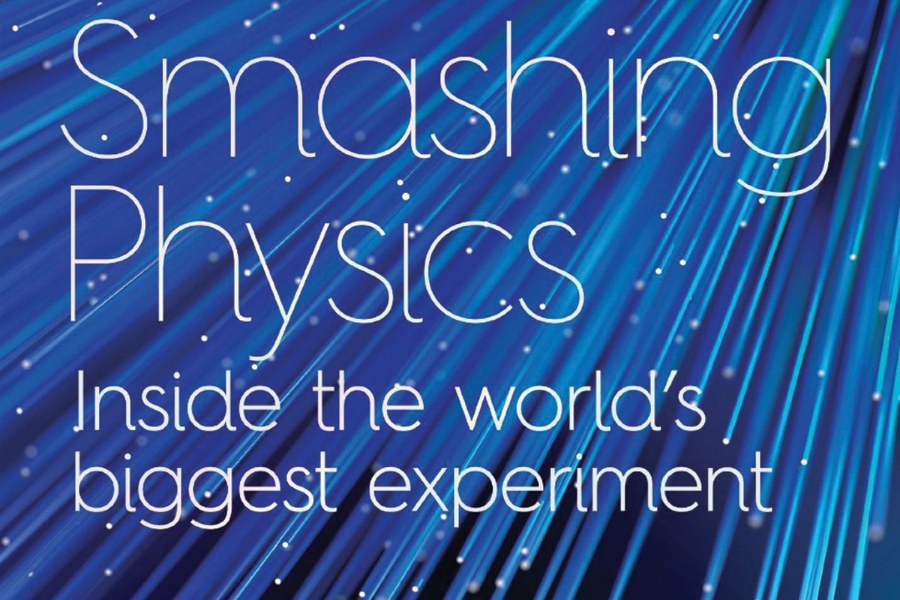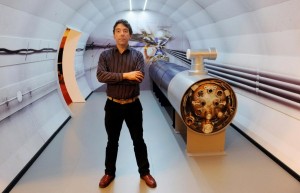Professor Jon Butterworth On Smashing Physics

Sci-fi continues to inspire the arts, and you can’t switch TV channels without seeing Dr Who or Brian Cox. So is science finally cool? Joseph Viney asks a CERN scientist…
This Friday marks the second anniversary of the discovery of the Higgs-Boson particle. Despite the media’s oddly gleeful reportage of the fact that the creation of the so-called ‘God Particle’ would tear the universe asunder, the news that the bods at CERN had finally cracked the case was met with a few clenched fists in Geneva and was well-received in the mainstream press.
For all of the fear-mongering and ‘what ifs’, *what* exactly had humanity stumbled upon?
Could we now develop worm holes and explore the universe? Was time travel possible? Can universes be recreated? Is there a chance to prove or disprove the existence of God?
Well… it’s all of the above, and also none of the above. C’est la science.
Professor Jon Butterworth’s talk at Liverpool One’s Waterstone last week, as part of the first ever Liverpool Science Festival, was the latest move in what seems to be a growing trend; the proliferation of hard science in the modern cultural lexicon.
Professor Butterworth is a physics professor at University College London. He is a member of the High Energy Physics group on the Atlas experiment at CERN’s Large Hadron Collider (LHC). His book, Smashing Physics: The Inside Story of the Hunt for the Higgs, was released earlier this year.
…but back to what Jennifer Aniston once called “the science part”.
The discovery of the Higgs-Boson inevitably divided opinion. In one camp, some claimed that its discovery answered the fundamental quandaries of our existence. Others claimed it simply posited more. What’s the truth?
“Well, they’re both true,” claims the Professor. “This is always the way with science. You do make real progress, you do answer questions but then they always raise other questions.
“But it doesn’t mean it’s circular. It means we move on. We know a lot more since the discovery of the Higgs-Boson, but we also have a lot more to ask ourselves.”
One question the public asked themselves upon reporting of the work of the LHC was: “Are these white-coats going to destroy the world?”, and “Can they be trusted?” It was as if the farcical maelstrom of Dr Strangelove had come to life.
As touched upon already, the press squealed with delight at the thought of such easy copy. “THE END OF THE WORLD” sells ‘papers. The reality was a lot more neutral and considered. The question remains, did such hysteria help or hinder the project?
Perhaps surprisingly, Professor Butterworth found it a help, and for interesting reasons.
“It was annoying at times, of course,” he laughs, “but at the same time, where science journalists might have struggled to have science stories published, or even considered by their editor, the supposed existential crisis created by the LHC was a chance for science to get out into the mainstream news again.
“It got people talking. When people spoke to me, or to any of my colleagues at CERN, most often their first question would be ‘are you going to destroy the universe?’ We’d say ‘no’, and then we could discuss what we were actually doing.

“It wasn’t good that people were scared by it. It was all very silly. But in terms of getting the knowledge out there it wasn’t entirely negative.”
It’s a lack of knowledge about science from your average person on the street that led to such unbelievable fears becoming widespread on the first place. Make no bones about it, science, and in particular particle physics, can be more than a little intimidating.
The intense leaps and bounds of domestic technology in the last two decades and the almost limitless access to information a large number of us enjoy means we probably know more than we actually realise.
Nonetheless, people may fear asking the basic questions lest they look a tad undercooked in the brain department. So is it the duty of the scientist to take the message to the people (the irony of appearing like a preacher notwithstanding)?
With appearances on Al-Jazeera and the BBC to his name, as well as a weekly blog on the Guardian’s website, Professor Butterworth is more willing and ready to take people’s questions head on.
“I see it as part of my job because it’s something I enjoy,” he said. “I don’t think it’s something that every scientist has to do. There are some scientists whose worst nightmare is to stand in front of a camera. They are brilliant scientists; it’s just not for them.
“But as long as there is willing and consent from a scientist to face the public, and to appear on television, then I believe the public has a right to know what we do and how we do it.
“I’ve learnt most of my physics by meeting people and answering what they feel are ‘dumb’ questions. It’s actually changed the way I think about my own field.”
Long gone are the days when science was shunted to the dark recesses of the nation’s television schedules. Experiments conducted in black and white and transmitted late at night like some sterile, knowledge-based pornography are now beamed into living rooms across the land during prime-time hours.
Professor Brian Cox, Dara O’Brian, Professor Robert Winston not long before them and the reaction to the passing of Sir Patrick Moore showed that science, the pursuit of objective truth, is very much a part of our collective hearts and minds.
In an age where Dr Who is king, and the subtle but no-less-speedy appropriation of science fiction into the mainstream continues unabated, where scores of people wear shirts emblazoned with the slogan ‘GEEK’ (hey, can anyone else hear the gnashing of teeth?), perhaps it’s time to ask the question: Is science finally…cool?
Counter question: Does it really matter?
“I think it’s already cool!” Butterworth laughs. “Of course it matters. Science is such an important part of how life and our societies function.
“Like anything else, science will go through phases and deal with all different kinds of cultural engagement. The more science and its practitioners engage with culture and society the better.”
…and finally, what’s next for CERN and its quest for answers?
“We come back in spring with more energy, more data, and we will look to make more precise measurements of the Higgs-Boson and other elements of our research.
“We’ve tackled the blight of having a hard question to answer. Maybe now is the time for a little more divergence with the knowledge we’ve gained. It’s an interesting time.”
It looks like the future might be in safe hands after all. Just watch out for black holes.
Joseph Viney
Smashing Physics: The Inside Story of the Hunt for the Higgs is out now
The first Liverpool Science Festival continues until 9 July 2014 — see programme here and on Twitter @livscifest
More on Professor Jon Butterworth on Twitter @jonmbutterworth and on the Guardian here





